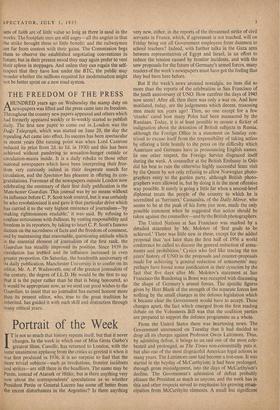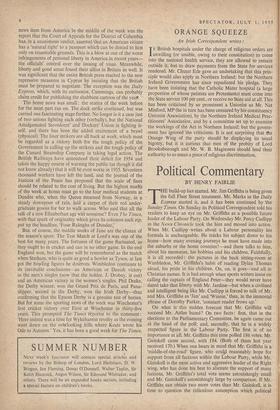Portrait of the Week
IT is not so much that history repeats itself. but that it never changes. In the week in which one of Miss Greta Garbo's greatest films, Camille, has returned to London, with the same unanimous applausQ from the critics as greeted it when it was first produced in 1936, it is no surprise to find that the more trivial subjects—such as revolutions, frontier incidents and strikes—are still there in the headlines. The name may be Peron, instead of Ataturk or Hitler, but is there anything very new about the correspondents' speculations as to whether President Peron or General Lucero has come off better from the recent disturbances in the Argentine? Is there anything very new, either, in the reports of the threatened strike of civil servants in France, which, if agreement is not reached, will on Friday bring out all Government employees from dustmen to school teachers? Indeed, with further talks in the Gaza area between representatives of Egypt and Israel. in an effort to reduce the tension caused by frontier incidents, and with the new proposals for the future of Germany's armed forces, many readers of the week's newspapers must have got the feeling that they had been here before.
But if the week's news' aroused nostalgia, no item did so more than the reports of the celebration in San Francisco of the tenth anniversary of UNO. How carefree the days of 1945 now seem! After all, then there was only a war on. And how mutilated, today, are the judgements which decent, reasoning men made ten years ago! Then, no one except for a few `cranks' cared how many Poles had been massacred by the Russians. Today, it is at least possible to arouse a flicker of indignation about the detention of British subjects in Russia, although the Foreign Office in a statement on Sunday con- trived to excuse itself from the responsibility of taking action by offering a little homily to the press on the difficulty which Austrians and Germans have in pronouncing English names. In one other respect, the Foreign Service disgraced itself during the week. A counsellor at the British Embassy in Oslo did his best to ruin the otherwise highly successful State visit by the Queen by not only refusing to allow Norwegian photo- graphers entry to the garden party, although British photo- graphers were allowed in, but by doing it in the most offensive way possible. It surely is going a little far when a second-level diplomat treats the people of the country to which he is accredited as 'furriners.' Cassandra, of the Daily Mirror, who seems to be at the peak of his form just now, made the only possible comment When he suggested that action should be taken against the counsellor—and by the British photographers.
The United Nations at San Francisco was marked by a detailed statement by Mr. Molotov of 'first goals to be achieved.' There was little new in these, except for the added proposal that `not later than the first half of 1956 a world conference be called to discuss the general reduction of arma- ments and prohibition.' Cynics who feel like tracing the ten years' history of UNO in the proposals and counter-proposals made for achieving 'a general reduction of armaments' may perhaps have found some justification in their cynicism by the fact that five days after Mr. Molotov's statement at San Francisco the Bundestag in Bonn was occupied with discussing the shape of Germany's armed forces. The specific figures given by Herr Blank of the strength of the separate forces lost nothing by the small changes in the defence legislation which it became clear the Government would have to accept. These changes apart, the fact which emerged from the first reading debate on the Volunteers Bill was that the coalition parties are prepared to support the defence programme as a whole.
From the United States there was heartening news. The Government announced on Tuesday that it had decided to drop all its charges against Professor Owen Lattimore. Thus. by admitting defeat, it brings to an end one of the most cele- brated and prolonged, as The Times non-committally puts it. but also one of the most disgraceful American legal actions in many years. The Lattimore case bad become a test-case. It was started in the heyday of McCarthyism; it had been prolonged. through gross misjudgement, into the days of McCarthyism's decline. The Government's admission of defeat probably pleases the President as much as anyone, and the week has in this and other respects served to emphasise his growing eman- cipation from McCarthyite elements. A small but significant news item from America in the middle of the week was the report that the Court of Appeals for the District of Columbia has, in a unanimous verdict, asserted that an American citizen has a 'natural right' to a passport which can be denied to him only on reasonable grounds. This is a blow at one of the worst infringements of personal liberty in America in recent years— the officials' control over the issuing of visas. Meanwhile, liberty and good sense found their allies in. Britain as well. It was significant that the entire British press reacted to the new repressive measures in Cyprus by insisting that the British must be prepared to negotiate. The exception was the Daily Express, which, with its cartoonist, Cummings, can probably claim credit for publishing the shabbiest cartoon of the year.
The home news was small : the stories of the week before for the most part ran on. The dock strike continued, but was carried one fascinating stage further. No longer is it a case just of two unions fighting each other (verbally), but the National Amalgamated Stevedores' and Dockers' Union is fighting it- self, and there has been the added excitement of a brawl (physical). The liner strikers are all back at work, which must be regarded as a victory both for the tough policy of the Government in calling up the strikers and the tough policy of the Cunard Steamship Company in taking legal action. The British Railways have announced their deficit for 1954 and taken the happy course of warning the public (as though it did not know already) that it will be even worse in 1955. Seventeen thousand workers have left the land, and the journal of the Justices of the Peace has proposed that the scale of fines should be related to the cost of living. But the highest marks of the week at home must go to the four medical students at Dundee who, when the Queen returned from Norway, in a steady downpour of rain, laid a carpet of their red under- graduate gowns for her to walk across. Who said that all the talk of a new Elizabethan age was nonsense? Even The Times, with that spark of originality which gives its columns such zip, put up the headline, 'Four. Raleighs of Dundee,' But, of course, the middle weeks of June are the climax of the season's sport. The Test Match at Lord's was one of the best for many years. The fortunes of the game fluctuated, as they ought to in cricket and can in no other game. In the ,end England won, but the game will be remembered as the match when Statham, who is quite as good a bowler as Tyson, at last got the bowling figures he deserves. Wimbledon continues to its inevitable conclusions—an American or Danish victory in the men's singles (now that the holder, J. Drobny, is out) and an American victory in the women's singles. Phil Drake, the Derby winner, won the Grand Prix de Paris, and Pana- slipper, second in the Derby, won the Irish Derby—thus confirming that the Epsom Derby is a genuine test of horses. But for some the sporting news of the week was Winchester's first cricket victory over Eton at Winchester in thirty-five years. This prompted The Times reporter to the comment : `Here indeed was a time fgt. Wykehamist revelry as the evening went down on the overlooking hills where Keats wrote his Ode to Autumn.' Yes, it has been a good week for The Times.















































 Previous page
Previous page